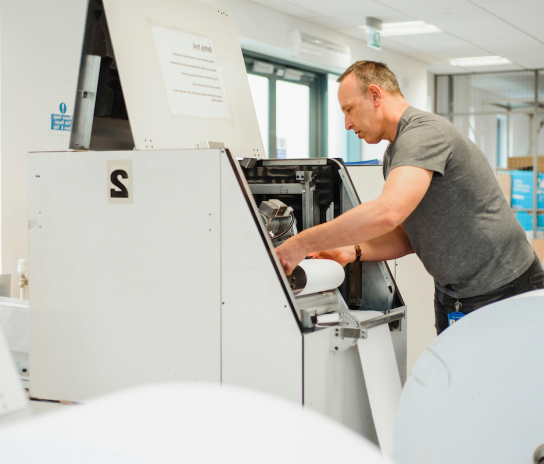Carole has a nursing background and initially started working with servicemen and women as a nurse at the recruiting office in Dundee for eight years. She then moved into a management role for a house of multiple occupancy for veterans.
After 13 years, Carole says she was keen to get back to working directly with people. She saw an opportunity to join Sight Scotland Veterans as an outreach worker as the perfect chance to do this, and started with the charity in 2013.

What are your main responsibilities as an outreach worker?
"I provide one-to-one practical and emotional support to veterans with sight loss who are members of Sight Scotland Veterans. I also organise and run social opportunities in my assigned members’ local areas, including lunch clubs and individual excursions.
“From the first home visit we’re building up a relationship and seeing how we can support each member. We offer continuity with the same outreach worker, so you can really build up a great relationship.
“I always ensure the veterans are receiving all the benefits available to them. If not, we can signpost them to the relevant body. I’ll make sure the local authority is aware of them and the support they might need relating to things like home adaptations.
“If there are tasks at home a member is finding difficult due to sight loss, we can provide practical equipment; anything from liquid level indicators and one-cup dispensers to talking books, talking watches and scales. For things like magnification, we’ll refer members onto our rehabilitation team.
“We also discuss social opportunities, hobbies and activities. The outreach team does a lot of local networking, linking up with different agencies and trying to use what’s available locally for our veterans. I run monthly Sight Scotland Veterans lunch clubs in Arbroath, Dundee and Kirriemuir. It’s a great opportunity for people in the local community to get together and meet others going through similar things. Partners can come along too.
“We’re always there to give advice, and it’s not just about being there to support in crisis situations. We’re a constant, and we get to know everyone individually.”
What's it like to be working remotely?
"I'm based in Dundee and support veterans living in East Dundee (West Dundee is covered by another Sight Scotland Veterans outreach worker) and Angus. I and my fellow Dundee-based outreach worker colleague have an office at Dundee Blind and Partially Sighted Society.
"The outreach workers regularly visit members at home, so my role involves plenty of travel. Sight Scotland Veterans’ outreach team is based across Scotland – covering every local authority area – therefore the outreach workers mostly work remotely.
“The week is usually broken up into a couple of days in the office and three days out on the road visiting members. I’ll usually start the day in the office, but if I’m covering Angus then I’ll work from home beforehand due to travel logistics. The travel was new to me in this role and I wasn’t sure how I’d find it, but I absolutely love it. I now find that if I’m in the office for too long I’ll have itchy feet and want to be out visiting our members.
“Working remotely is okay because communication in the outreach team is great. Everybody keeps in touch and there’s still a great team spirit. You never feel alone even though everyone is working in different areas.”
What’s key to bear in mind as an outreach worker?
“At the very beginning of that journey, sight loss can feel like a bereavement for a person. Another of the major things with sight loss is that the people going through it, as well as their families, can become isolated so quickly. Once they’re isolated, it’s professionally challenging to build up their confidence and get them out and about again. We’re there to build up their confidence, provide the information and advice they need and help them make the most of available opportunities.
“The vast majority of our members tend to be of older age, so enjoying working with older people is important. In this role, you learn the importance of good communication skills.”
What kind of training and development has been available to you?
“Training is high on the agenda at Sight Scotland Veterans. The outreach team receives plenty of in-house training.Training with the rehabilitation officers is really good because they keep us up to date and well-informed on any equipment we can provide to members.
“There are courses we can attend online or in person as well, for example, we’ve done mental health first aid training for veterans. If there’s anything you think would be beneficial to you and your role you’ll usually get the go ahead.”
What do you enjoy most about your job?
"One of the most fulfilling parts of my role is being able to find solutions for the veterans we support.
“You can see right away that you’re making a difference to someone’s life. You’ve got the tools at hand. It can be something as simple as a fluid level indicator or a one-cup dispenser for someone who hasn’t been able to make a cup of tea themselves after losing their sight. Suddenly, they’re doing it on their own again.
“A lot of members tell me it’s so reassuring to know that they have someone they can call that they have met and trust. I can look into most things for them and find a way to help. It’s not always necessarily about sight loss.
“It’s also lovely at the lunch clubs to stand back and just hear this babble of chatter. With many members starting out not knowing anyone at first, it’s just great because it shows the friendships that have been made through the group.”
You may also be interested in
Sight Scotland Veterans history
A charity formed in 1915 to help servicemen blinded in WW1, we carry on today as Sight Scotland Veterans, the charity for veterans with sight loss.
Independent Living
Learn more about how Sight Scotland Veterans' expert rehabilitation team could support a veteran with sight loss you know to regain and maintain their independence.
Skills and hobbies
We're committed to responding to every individual's interests, enabling the joys of life to be regained or newly discovered.
Current vacancies
Want to work with us? Find out what roles are available now, and apply.
